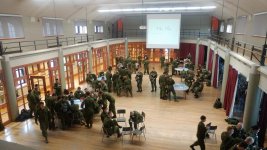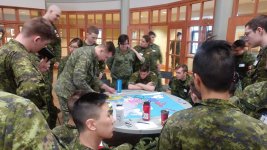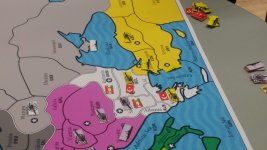Halifax Tar said:
It’s been a while since I did my JLC/PLQ I think we were assessed as 2 I/C and I/C. I could be wrong though.
Anyways I would like to see leadership training delegated down to branches. As an example I will use for this is the Log Branch (I know RCLS now).
You are never, ever, going to use logisticians to advance to contact and clear trenches; if you are using us all doctrine has failed and rear echelons are now in the wrong position and our position is probably dire to begin with. But we should be able set up camps and ordinance parks, conduct CLPs and DPs and hold the ground we are on. All of these can produce easily relatable scenarios that Log troops can find commonality in and gain some real world value for future deployed employment.
I stand by to recieve the diluge of: "but I know a cook who says they stormed a taliban filled wadi with a C7 in one hand and lobbing grenades with the other; while in the stan so we all need to operators operating operationally ALL THE TIME".
As for the post-pandemic part, I think we are going to see allot of our archaic processes and necessities get vetted and rightly so. We are a terrible institution for doing things just because that’s the way they have always been, instead of optimizing and improving. I have no doubt we all have examples of that.
I disagree that branches should train themselves. That's incestuous and I've worked in a few organizations that self-validate and have seen the problems that can create.
PLQ is supposed to be a common course, the problem is it's basically a JInfantry course that doesn't acknowledge that there are other tasks carried out by different environments/trades that are just as difficult.
I personally think PLQ should be environment specific and that the environments should focus on leadership specific to that trade.
Damage Control scenarios would be a great thing to test Navy Pers on for instance.
Likewise, I think PLQ should put a greater emphasis on problem solving, logic, development of communication skills, etc. There are tonnes of ways to do this that don't involve anything occupation specific.
Attached is an example of something I did with 1st year RMC Cadets as an instructor at RMC.
I ran a simulation using the game Diplomacy. Cadets were broken in to teams of eight and were given the task of running a specific Nation through a campaign against their peers who also controlled specific Nations.
There was no dice involved and the focus of the simulation was to practice/develop the following skills:
Teamwork
Logic
Coordination
Interpersonal Communication
Decision Making
I built the boards and developed the activity myself. It's fairly easy to do stuff like this and people actually learn something about themselves and others in the process. The Simulation was executed and Administered by a number of fourth year Cadets.





